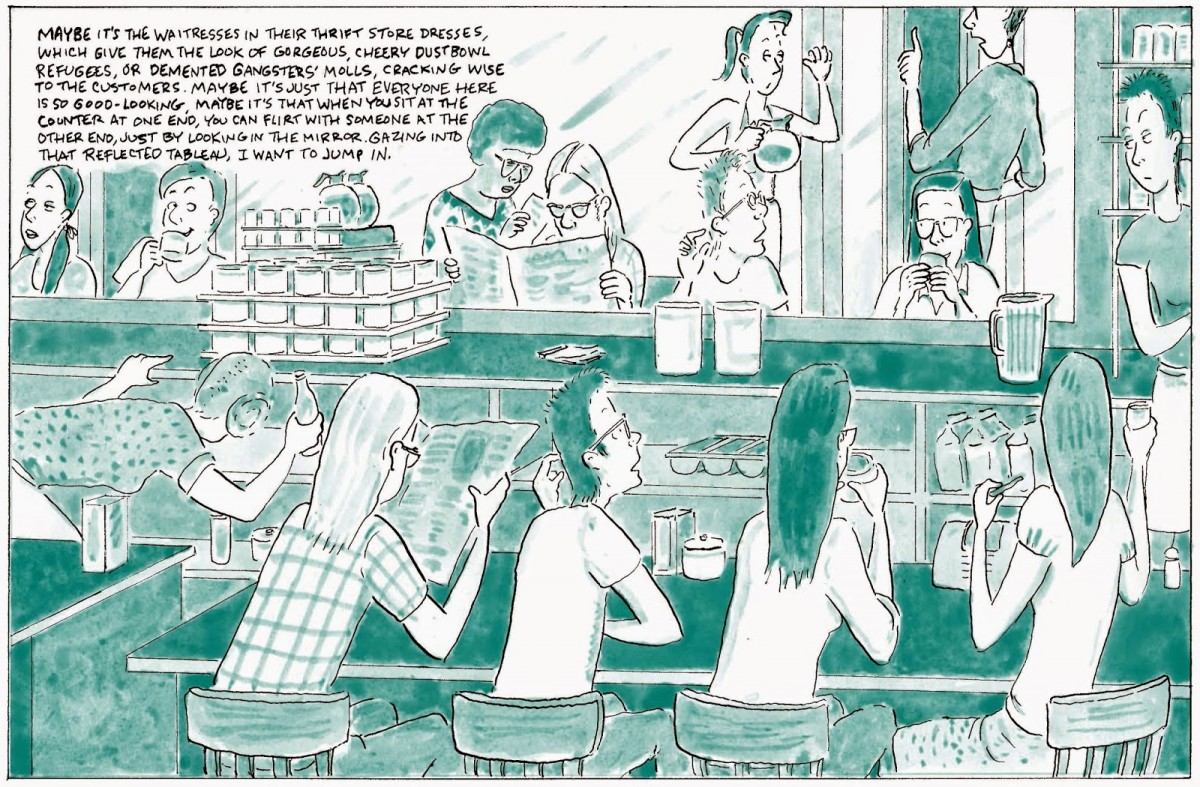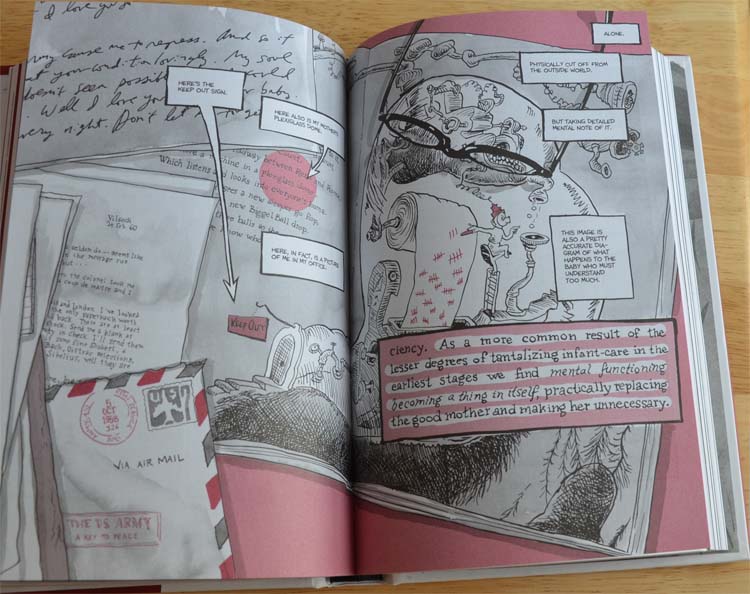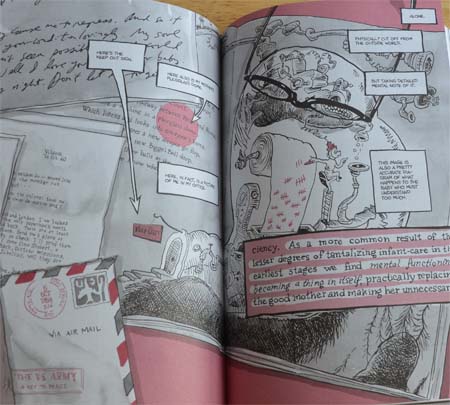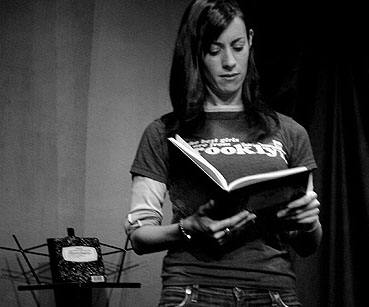Mimi Pond is most recently the author of Over Easy.
Author: Mimi Pond
Listen: Play in new window | Download
Subjects Discussed: Different forms of memoir (and related resistance by publishing), James Frey, autobiographical fiction vs. memoir in comics, realizing Over Easy from a manuscript, working from a textual framework, trash-talking line cooks, Charles Dickens, Daniel Clowes, comic book characters often cast into inevitable film adaptations, imagination, picture books, Mama’s Royal Cafe as a locational inspiration, memory vs. reference shots, the difficulty of filling up sketch books while waiting tables, the mysterious Nestor Marzipan, keeping in touch with former restaurant co-workers, keeping gossip alive, taking notes, when memories elude the nostalgia trap, what 1978 establishments can teach 21st century diners, drugs and the willful stupidity of kids, disco wars, how a rudderless culture was maintained by a manager who made waitresses feel special by listening, what people found charming about diners in 1978, Stewart O’Nan’s Last Night at the Lobster, Todd Haynes’s miniseries adaptation of Mildred Pierce, dramatizing working-class life, how dishwaters can form more legitimate claques than art school, the haziness of art school, the green chromatic feel throughout Over Easy, the one character with a jet black character in the book, the cameo appearance of Flipper‘s Ted Falconi, “Art is dead!” proclamations, maintaining aesthetic standards during a time of bad music and bad art, the oppressive nature of avocado green, young kids today who glorify the 1970s, Peter Frampton, the band America, the influence of Alison Bechdel’s Fun Home, people who overanalyze comics, the early seeds of storytelling, being nursed at the bosom of MAD Magazine, working with Shary Flenniken at the National Lampoon, learning the basics of a comic strip, circular text around objects, cartoonists and the daily grind, doing monthly strips for the Voice, social commentary in comics form, drowning babies, editorial arguments with Drawn and Quarterly, politically incorrect language excised from the finished product, ironic epithets from 1970s liberals, the importance of getting upset to understand a time, Norman Mailer’s “fug,” living in a high mesa in San Diego comparable to the unshaded area of a picnic table, public park metaphors for living circumstances, the New York Times‘s claim that Oakland is the new Brooklyn, being attracted to bad poets before knowing their poetry is bad, the lack of good coffee in the 1970s, diners that once used real linen napkins, the virtues of not being judged for sleeping with anyone in 1978, and slut shaming and Lulu.
EXCERPT FROM SHOW:
Correspondent: What specific points in 1978 did you really feel compelled to capture? I mean, how could you do 1978 right while also adhering to the exigencies of narrative, which requires a kind of linear path and all that? What was the organizational process like?
Pond: I was just remembering things the way they were then. Things that really stuck with me. And I worked on this over a fifteen-year period, from about 1998 until early this year. It wasn’t so much that I was like “I’m going to capture 1978!” It was “I’m going to remember it the way I’m going to remember it.” So it wasn’t anything that specifically deliberate. It was just the time and the place and what it felt like at the time. And I did take notes over the years from the time I left up until 1982, until about 1998, and I also went back to visit many times. And I talked to my former co-workers, who very generously shared their experiences with me, which I also incorporated into the story.
Correspondent: Were there any stories or anecdotes that were pure romantic forms of nostalgia? Or things you wish would have happened? Anything along those lines?
Pond: No. I don’t think of it as nostalgia. Because there were too many hard lessons learned.
Correspondent: It was too rough to be nostalgic. (laughs)
Pond: Yeah, it was too rough to be nostalgic and there were too many people who wound up down the rabbit hole of drug abuse for too many years to have the dewy glow of nostalgia around it. It was one of those situations where it was really following up to a point until it wasn’t fun anymore. And there’s going to be a Part Two. I’m working on that now.
Correspondent: I know that.
Pond: Part Two gets darker.
Correspondent: Well, what about Part One? Did the darkness threaten to overwhelm some of the romance of the diner? The kind of effervescent look of the place and the feel of the actual book?
Pond: No. I don’t think so. I mean, I’ve always been in love with the look of that place. The first time I walked into it, it just felt like home. So I could just draw that counter and those booths and all that stuff endlessly.
Correspondent: Well, what does a diner like the Imperial — I mean, what could it teach diners of today? What does a 21st century diner not have that the Imperial did have?
Pond: Well, there were no rules. In the ’60s, the hippies threw out all the rules. And in the ’70s, we looked up and we just said, “Oh, the rules are gone. So which ones do we put back? And which ones do we leave out? And how does this all work?” And it was kind of up to you to figure it out. There was no one saying, “Just say no.” So everyone was going, “Woohoo! Drugs! Yeah, drugs are fun!” Like no one said, “That cocaine thing? That’s not such a good idea.” “Jazz musicians used to snort cocaine in the ’30s. So it’s really cool, right?” And kids are always stupid. And this is what drug abuse is about. Like heroin, people are just stupid enough. “I’m not going to get hooked!”
Correspondent: What was the common ground of such a place? You mention early on how the disco wars were what united the punks and the hippies. And then at the end of the book, we see this poetry night in which everybody is allowed his particular moment. Does it really take a place to unite so many subcultures? So many groups? What was the cross-pollination at the time that you were trying to capture here?
Pond: Well, the uniting force in that particular place was Lazlo Meringue, the manager.
Correspondent: Who everybody told their problems to.
Pond: Yeah. Everyone told him their problems. And he was one of those people that just made you feel like you were the most important person in the room. And he validated your experiences by telling you that the fact that you had observed this and you think that about it is meaningful. Not just “Oh! You’re full of shit.” And the other thing was that, yes, this was important and we need to write this down. Because we’re going to make some kind of art about this later. And that was very important to me. And it made all the difference. I mean, I don’t think I ever could have worked in any other restaurant after that. I made a few futile stabs at putting in applications after I left that place, but luckily — I say luckily — no one ever hired me again. And then I had a career as a cartoonist and I never had to go back to that. But it never would have been the same. I mean, his motto was “The Customer is Always Wrong,” which did not really mean that you were entitled to give bad service. In fact, we all kind of prided ourselves on giving good service. It was more like he had your back. And if anyone gave you any crap, he would back you up.
Correspondent: And presumably the walls between the kitchen and the restaurant were thick enough to prevent any of the customers from hearing all of the profane screeches and all that.
Pond: I think, at the time, people were down for that too. Because that’s the kind of place it was. A cook would drop the end of his roach into an omelet and the customer would finally go, “Oh, I found this. Ha ha ha!”
Correspondent: “How charming!”
Pond: Yeah.
(Loops for this program provided by 40a, dj4real, minor2go, and platanos. )
The Bat Segundo Show #548: Mimi Pond (Download MP3)


 Bechdel: Oh, I think of that Dr. Seuss spread, which was a purely visually driven sequence. I’m talking about one of my favorite childhood books, which was Dr. Seuss’s Sleep Book.
Bechdel: Oh, I think of that Dr. Seuss spread, which was a purely visually driven sequence. I’m talking about one of my favorite childhood books, which was Dr. Seuss’s Sleep Book. 
 Correspondent: I should point out I’m not trying to insist that stretching [the truth] is necessarily a bad thing. I’m merely pointing out that memory, as we all know, is a fallacious instrument.
Correspondent: I should point out I’m not trying to insist that stretching [the truth] is necessarily a bad thing. I’m merely pointing out that memory, as we all know, is a fallacious instrument.
 Correspondent: I think we should really clarify this for the record. I mean, the stripes on Mo’s shirt become more pronounced over the course of time. And they increasingly grew thicker during the course of the early ’90’s. And then sometime around 1995, they solidified into that absolute thickness that we have enjoyed for the last decade or so. I know there have been many Harry Potter jokes that you’ve thrown around. But you were there, of course, before Harry Potter.
Correspondent: I think we should really clarify this for the record. I mean, the stripes on Mo’s shirt become more pronounced over the course of time. And they increasingly grew thicker during the course of the early ’90’s. And then sometime around 1995, they solidified into that absolute thickness that we have enjoyed for the last decade or so. I know there have been many Harry Potter jokes that you’ve thrown around. But you were there, of course, before Harry Potter.